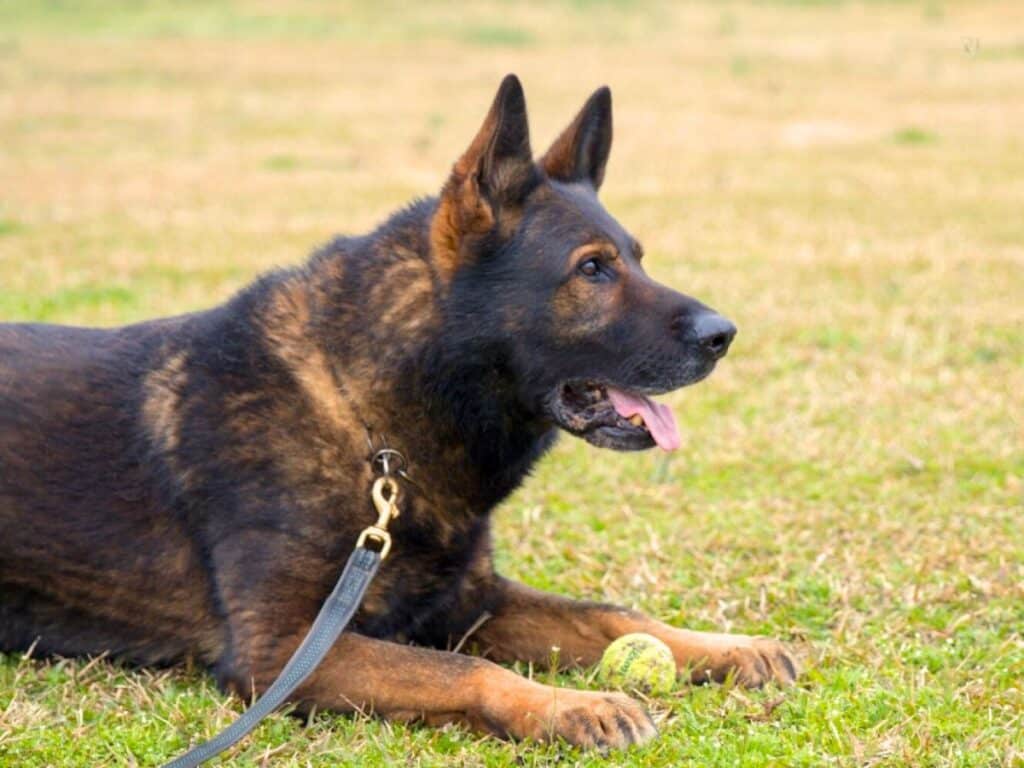If you’re a proud owner of a 4-month-old German Shepherd, congratulations! You’re in for a wild and exciting ride with one of the most intelligent and loyal dog breeds around.
However, as with any puppy, raising a German Shepherd pup can also be challenging and requires a lot of time, patience, and dedication.
In this blog post, we’ll explore what you can expect from your 16-week-old German Shepherd, as well as provide some helpful tips and advice to help you navigate this critical stage of their development.

4-Month-Old German Shepherd Overview
| Appearance | Well-proportioned body, erect ears, bushy tail |
| Height | 11 -14 inches |
| Weight | 35 – 40 pounds |
| Coat | Double coat with a dense, straight or slightly wavy outer coat and a softer undercoat |
| Energy Level | High energy, playful, and enthusiastic |
| Exercise Needs | Requires 30 mins – 1 hour of regular exercise and mental stimulation |
| Socialization | Sociable, enjoys interaction with people and other animals |
| Training | Intelligent and trainable; benefits from consistent, positive reinforcement training |
| Behavior | Curious, may start showing independence, protective instincts, and stubbornness |
| Teething | Chewing is a common behavior to soothe teething discomfort |
| Diet | Feeding 3-4 times a day with a balanced puppy diet |
| Healthcare | Regular vet check-ups, vaccinations, and preventive care |
| Sleep | 14-16 hours of sleep per day; may be more active during waking hours |
| Toilet Training | In the process of toilet training, requires frequent bathroom breaks |
| Playtime | Enjoys interactive play, fetch, and chewing on appropriate toys |
| Sexual maturity | No, GSDs reach sexual maturity between 6 to 12 months of age |
4 Month Old German Shepherd Weight
At four months old, male German Shepherd puppies can weigh between 35-40 pounds on average, while female puppies can weigh around 30-35 pounds. However, this is just an estimate as weight can vary depending on genetics and diet. (Source)
Gender plays a significant role. Male German Shepherds tend to have a more muscular and larger build compared to females, who are generally leaner and smaller in size.
How Big is a 4 Month Old German Shepherd?
At four months, a male German Shepherd will have a shoulder height between 11 and 14 inches. A female German Shepherd will have a shoulder height between 10 and 12 inches.
What Does a 4 Month Old German Shepherd Look Like?
While still considered puppies at four months old, GSDs are already showing signs of their adult dog appearance.
German Shepherds at this age will have a lanky appearance with long legs and a lean body.

They are still growing into their bodies and may look disproportionate at times.
Their ears may still be floppy or starting to stand up, which is a unique trait of the breed.
The coat also starts changing at this age. Their fur will begin thickening and becoming coarser as they grow older.
At this age, they start losing their milk teeth, making way for their permanent teeth. This process can be uncomfortable for the puppy and may cause them to chew on things more often than usual.
GSD Growth Chart
The German Shepherd Growth and Weight Chart below provides a comprehensive visual guide to track the developmental milestones of your pup during the crucial growth stages.

To understand more about the typical growth trajectory and weight range for your German Shepherd puppy from birth to adulthood, please refer to my article German Shepherd Male & Female Growth Chart.
RELATED:
4 Month Old German Shepherd Behavior
When it comes to the behavior of a 4-month-old German Shepherd, there are several common traits and tendencies that you can expect. At this age, a German Shepherd puppy is in a stage of active development and exploration.
Let’s take a closer look at some of the key behaviors you may notice in your pup:
1. Playfulness
At this age, German Shepherds are full of energy and love to play. They enjoy engaging in games like fetch, tug-of-war, and chase.
Their playful nature is a great opportunity for you to bond with them and provide mental and physical stimulation.
2. Curiosity
As your German Shepherd grows, their curiosity about the world around them increases. They may investigate new scents, objects, and sounds with great enthusiasm.
3. Teething
Just like human babies, German Shepherd puppies go through a teething phase at around 4 months old.
During this time, they may chew on various objects to relieve discomfort and help their new teeth grow.
It’s crucial to provide appropriate chew toys to redirect their chewing behavior and protect your belongings.

4. Independence
As your German Shepherd puppy grows, they may start displaying more independent behaviors.
They may become more self-assured and less reliant on you for constant attention. This is a natural part of their development, but it’s still important to maintain consistent training and reinforcement.
5. Testing Boundaries and Rules
At this age, German Shepherds may start to display signs of stubbornness and testing boundaries. It’s crucial to establish clear expectations and consistent training to shape their behavior.
6. High Energy Levels
German Shepherds are known for their high energy levels, and this is especially true at 4 months old.
Regular exercise and mental stimulation are vital to keep them happy and prevent destructive behaviors that may result from pent-up energy.
7. Impulsivity
As young dogs, German Shepherds can sometimes act impulsively. They may jump, nip, or bark excessively out of excitement or frustration.
Patiently teaching them appropriate behavior and providing outlets for their energy will help address these impulsive tendencies.
8. Attention-Seeking
Your puppy may seek attention from you and other family members. Positive interactions, such as petting, praising, and play, reinforce a strong bond between you and your puppy.
Check out this home video about a 4-month-old German Shepherd puppy…
Common Behavioral Problems
Biting
Biting is a common issue at this age. Puppies explore the world with their mouths, and biting is a natural behavior for them.
However, it’s important to teach them bite inhibition through positive reinforcement training. This means teaching your puppy to control the force of their bites so they don’t hurt humans or other dogs.
One way to do this is by yelping or saying “ouch” when your puppy bites too hard. This mimics how other puppies would react if bitten too hard during playtime.
By doing this, you are teaching your puppy that biting too hard results in playtime ending.
For more guidance on teaching bite inhibition, you can check out my article: How To Stop German Shepherd Puppy From Biting

Aggression
According to the American Kennel Club, puppies may display behaviors that are mistaken for aggression, but they are often rooted in fear, insecurity, or a lack of proper training.
First and foremost, rule out any potential medical issues that may be causing discomfort or pain.
Proper socialization is crucial at this stage. Expose your puppy to a variety of people, places, and other animals in a positive and controlled manner.
Start basic obedience training early. Teach commands like sit, stay, and come using positive reinforcement techniques.
Ensure your puppy gets enough mental and physical exercise through play, walks, and interactive toys.
You may also refer to my guide on how to discipline a German Shepherd puppy.
Destructive Chewing
Chewing is a natural behavior for puppies as they explore the world around them and relieve discomfort during the teething stage.
Providing appropriate puppy chew toys can prevent destructive chewing on household items such as furniture or shoes.
Excessive Barking
Barking can be a sign of boredom or anxiety in dogs. Providing mental and physical stimulation through exercise and interactive toys can help reduce excessive barking.
Take your puppy for daily walks or playtime with other dogs to burn off excess energy. Provide puzzle toys or treat-dispensing toys to keep their minds occupied when you’re not around.

Feeding Guidelines for 4-Month-Old German Shepherds
Feeding your 4-month-old German Shepherd can be a bit tricky, as their nutritional needs are different from when they were younger. It’s important to provide them with the right balance of nutrients to support their growth and development.
Here are some feeding guidelines to help you ensure your German Shepherd is getting the nutrition they need:
1. Choose a high-quality puppy food
Look for a puppy food specifically formulated for large breed puppies. These foods have the right balance of nutrients to support healthy bone and muscle development.
2. Follow the feeding instructions on the package
The packaging of the puppy food will provide guidelines on how much to feed your 4-month-old German Shepherd based on their weight.
Follow these instructions as a starting point, but keep in mind that every dog is different, so you may need to adjust the amount based on your dog’s individual needs.
3. Divide the daily portion into multiple meals
Instead of feeding your German Shepherd one large meal, divide their daily portion into three or four smaller meals. This helps prevent bloating and improves digestion.
Moreover, this also helps provide a consistent source of energy and nutrients throughout the day.
4. Avoid overfeeding treats
While it’s tempting to spoil your German Shepherd with treats, it’s important to limit their intake. Treats should only make up a small portion of their daily caloric intake to avoid weight gain.

5. Provide fresh water at all times
Make sure your German Shepherd has access to fresh water at all times. They may be more active at this age and will need to stay hydrated.
6. Transitioning
If you decide to switch your puppy to a different brand or type of food, do so gradually over a week to prevent digestive upset.
7. Monitor your dog’s weight
It’s important to keep an eye on your German Shepherd’s weight to ensure they are growing at a healthy rate. If you notice that they are gaining weight too quickly or not gaining enough, you may need to adjust their portion sizes.
8. Consult with a veterinarian
If you have any concerns about your German Shepherd’s diet or if you’re unsure about the right amount to feed them, it’s always a good idea to consult with a veterinarian. They can provide personalized advice based on your dog’s specific needs.
Remember, every dog is different, and these feeding guidelines are just a starting point. It’s important to monitor your German Shepherd’s weight and adjust their portion sizes as needed.
For more guidance, you can check out my guide on feeding a German Shepherd puppy.
Is a Raw Diet OK for a 4 Month Old GSD Puppy?
Raw diets may not be suitable for 4-month-old German Shepherds as they require a specific balance of nutrients that may not be present in raw food.
Raw diets can contain harmful bacteria such as Salmonella or E.coli that can make both pets and humans sick. (Research)
How Much Should a 4 Month Old German Shepherd Eat?
As a general guideline, a 4-month-old German Shepherd puppy should eat around 2 – 4 cups of puppy food divided over 3 – 4 meals per day.
It’s important to follow the feeding guidelines provided by the manufacturer on the packaging of the puppy food. These guidelines are typically based on the weight of the dog.
4 Month Old German Shepherd Not Eating
If your pup is not eating, it can be a cause for concern and may indicate various underlying issues. Changes in appetite can be influenced by factors such as illness, dental problems, stress, or a shift in the environment.
It’s important to closely monitor your puppy’s behavior, energy levels, and overall well-being. If the lack of appetite persists for more than a day or is accompanied by other concerning symptoms like lethargy, vomiting, or diarrhea, it is highly recommended to seek prompt veterinary attention.
A veterinarian can perform a thorough examination, run diagnostic tests, and determine the root cause of the decreased appetite.
RELATED: Common German Shepherd Health Issues

Training a 4 Month Old German Shepherd
Training a young GSD can be an exciting and rewarding experience. At this age, your furry friend is eager to learn and explore the world around them.
However, it’s important to approach training with patience, consistency, and positive reinforcement.
Here are some tips to help you train your 4-month-old GSD:
1. Socialization
Introduce your German Shepherd to various people, animals, and environments to help them become well-rounded and confident. Take them on walks, visit parks, and arrange playdates with other friendly dogs.
RELATED: How To Socialize Your German Shepherd Puppy
2. Teach Basic Commands
Start with teaching your German Shepherd basic commands like “sit,” “stay,” and “come.” Use treats and praise as rewards for good behavior. Keep training sessions short and fun to maintain their interest.
RELATED: 30 Simple German Shepherd Training Commands
3. Leash training
Teach your German Shepherd to walk on a leash without pulling. Start in a quiet area and gradually introduce distractions. Use positive reinforcement techniques and reward them for walking calmly by your side.
RELATED: German Shepherd Puppy Leash Training Guide

4. House training
Establish a routine for bathroom breaks and reward your German Shepherd for eliminating in the appropriate spot. Supervise them closely indoors and take them outside frequently, especially after meals or naps.
RELATED: How To Potty Train Your German Shepherd Puppy
5. Crate training
Introduce your German Shepherd to a crate as a safe and comfortable space. Use positive reinforcement to encourage them to enter the crate voluntarily. Gradually increase the time they spend inside, making it a positive experience.
RELATED: German Shepherd Crate Training Guide
6. Enroll in professional training classes
Enroll your German Shepherd in obedience classes or work with a professional trainer to enhance their training skills. This will provide structured learning opportunities and help strengthen the bond between you and your dog.
7. Provide Mental stimulation
German Shepherds are intelligent and need mental stimulation to prevent boredom and destructive behavior. Provide puzzle toys, interactive games, and training exercises that challenge their minds.
Remember, training takes time and consistency. Be patient with your German Shepherd and celebrate their progress along the way. By investing in their training at this young age, you will set them up for a lifetime of good behavior and a strong bond with you as their owner.
Care Guide for Your 4-Month-Old German Shepherd
Caring for a young pup involves providing proper nutrition, training, socialization, healthcare, and a safe and stimulating environment.
Here’s a comprehensive care guide for your German Shepherd puppy:
Feeding
- Feed your pup a high-quality puppy food that is specifically formulated for large-breed puppies.
- Divide their daily food intake (2 to 4 cups) into 3 to 4 meals, spaced evenly throughout the day.
- Provide fresh water at all times and ensure they have access to it throughout the day.
Exercise
- Aim for at least 30 minutes to 1 hour of exercise each day, including both physical and mental stimulation.
- Take them on walks, play fetch, or engage in other activities that allow them to burn off energy.
- Avoid excessive strenuous exercise to protect growing joints.
RELATED: How Much Exercise Does a German Shepherd Puppy Need?

Training
- Teach them commands such as sit, stay, and come using positive reinforcement techniques.
- Use treats and praise to reward good behavior.
- Consider enrolling them in a puppy training class to further their socialization and training skills.
Socialization
- Socialize your German Shepherd puppy with a variety of people, animals, and environments.
- Expose them to different sights, sounds, and experiences to help them become well-rounded adults.
- Take them to puppy playdates or dog parks to interact with other dogs.
- Introduce them to new people and situations in a positive and controlled manner.
Grooming
- Brush your German Shepherd’s coat regularly to keep it clean and free from tangles.
- Bathe them as needed, typically every few months or when they get dirty.
- Trim their nails regularly to prevent overgrowth and discomfort.
- Clean their ears regularly to prevent infections.
Health Care
- Schedule regular veterinary check-ups for your 4-month-old German Shepherd to ensure they are healthy and up to date on vaccinations.
- Keep up with flea and tick prevention, as well as heartworm prevention.
- Watch for any signs of illness or injury and seek veterinary care if needed.
ID and Microchip
- Ensure your puppy wears a collar with identification tags.
- Consider microchipping as an additional means of identification.
Safety
- Create a safe and secure environment for your German Shepherd puppy.
- Puppy-proof your home by removing any potential hazards or toxic substances.
- Provide them with a comfortable and secure crate for sleeping and when you’re not able to supervise them.
- Use appropriate restraints, such as a leash or harness, when taking them outside or traveling in the car.
RELATED: How Many Hours Do German Shepherds Sleep?

4 Month Old German Shepherd Ears Not Up
At four months old, it’s not uncommon for German Shepherd puppies to have ears that are not fully erect. The development of upright ears is influenced by a combination of genetics, nutrition, and the individual growth of the puppy.
Teething can impact the cartilage in the ears, causing them to temporarily droop. To support ear development, ensure your puppy is receiving a balanced and high-quality puppy food appropriate for their age and size.
Gentle ear massages may stimulate blood flow and encourage cartilage development.
For more information regarding your GSD’s ears being down, please go through my article: When Do German Shepherd Ears Stand Up?
4 Month Old German Shepherd in Human Years
A 4 month old German Shepherd in human years is approximately 5 years old.
When trying to approximate a dog’s age in human years, it’s important to note that the conversion is not a straightforward one-to-one ratio. The commonly cited “seven dog years to one human year” is an oversimplification.
Some sources suggest that the first year of a medium-to-large breed dog’s life may be equivalent to around 15 human years. The second year of a dog’s life is approximately equivalent to nine human years.
After the first two years, each human year is roughly equivalent to five dog years.
So, for a 4-month-old German Shepherd:
Approximate Human Age ≈ Dog’s Age in Months × (15/12)
Approximate Human Age ≈ 4 ×1.25
Approximate Human Age≈ 5 years
For more information, refer to the below German Shepherd Age Chart:

Conclusion
In conclusion, 4-month-old German Shepherds are playful, curious, and full of energy. They are eager to learn and explore their environment, making it a crucial time for their development.
While they may exhibit certain behaviors, such as chewing and separation anxiety, these can be addressed with patience, positive reinforcement, and appropriate training techniques.
Frequently Asked Questions (FAQs)
What to expect from a 4-month-old German Shepherd?
At 4 months old, German Shepherd puppies are playful, curious, and energetic. They may exhibit behaviors such as chewing, socialization, separation anxiety, and training. As a responsible owner, it’s essential to provide them with appropriate training, socialization, and activities to help them grow into well-behaved adult dogs.
How far can a 4-month-old German Shepherd walk?
A 4-month-old German Shepherd puppy can walk for short distances, but they should not be overexerted. As a general rule, a 4-month-old puppy should not walk for more than 10-15 minutes at a time and no more than twice a day. Over-exercising can lead to joint and muscle damage.
Can a 4-month-old German Shepherd get pregnant?
No, a 4-month-old German Shepherd puppy is not yet sexually mature and cannot get pregnant. Sexual maturity typically occurs between 6 to 12 months of age.
How much should a 4-month-old German Shepherd sleep?
A 4-month-old German Shepherd requires around 14 to 16 hours of sleep per day. They should be provided with a comfortable and safe sleeping environment, such as a crate or bed, to help them get the rest they need.




